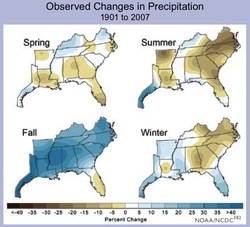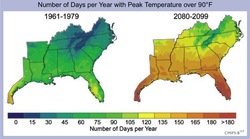The South's deepening climate crisis
 A new federal report describes the impacts that man-made climate change is already having on the various regions of the United States, and it warns of dramatic disruptions on the way if we fail to reduce carbon pollution significantly and soon.
A new federal report describes the impacts that man-made climate change is already having on the various regions of the United States, and it warns of dramatic disruptions on the way if we fail to reduce carbon pollution significantly and soon.The U.S. Global Change Research Program released the report as Congress is working on landmark legislation designed to curb heat-trapping pollution. Yesterday the Senate Energy and Natural Resources Committee approved the Waxman-Markey bill, which would cap carbon emissions and set up a pollution permit trading system. The report also comes as climate justice activists are ratcheting up pressure on governments worldwide to address the worsening crisis.
"It tells us why remedial action is needed sooner rather than later, as well as showing why that action must include both global emissions reductions to reduce the extent of climate change and local adaptation measures to reduce the damage from the changes that are no longer avoidable," said John P. Holdren, director of the White House Office of Science and Technology Policy.
The study documents the changes that have already taken place across the country including in the Southeast, which the report defines as stretching from Virginia south and west to the Texas Gulf Coast. The changes already experienced in the Southeast include:
* An 2 degree F. increase in the average annual temperature since 1970;
* A four- to seven-day decline in the number of freezing days for most of the region since the mid-1970s;
* A 30% increase in average autumn precipitation;
* An increase in heavy downpours; and
* An increase in the area experiencing moderate to severe drought.
 Climate models predict continued warming across the Southeast for all seasons, with the increase expected to be double that experienced since 1975. The greatest increases are likely to come in the summer, with the number of very hot days projected to rise faster than the average temperature.
Climate models predict continued warming across the Southeast for all seasons, with the increase expected to be double that experienced since 1975. The greatest increases are likely to come in the summer, with the number of very hot days projected to rise faster than the average temperature.Even if steps are taken to hold down emissions, average temperatures in the Southeast are still expected to rise by about 4.5 degrees F. by the 2080s. But higher emissions could results in a temperature increase of about 9 degrees F. on average in the region, with about a 10.5 degree F. increase in summer.
Such dramatic warming would create serious health problems for people, animals, fish, forests and crops. It would also make water less available, which will affect the region's economy as well as its ecology.
In another change that would take a heavy economic toll on the South, the study predicts more intense Atlantic hurricanes with higher winds, heavier rainfall and greater storm surge. But even if hurricanes don't increase in intensity, the report says, "coastal inundation and shoreline retreat would increase as sea-level rise accelerates, which is one of the most certain and most costly consequences of a warming climate."
Across the country, U.S. climate justice activists are working to strengthen the watered-down climate legislation currently being considered in Congress. The Southern Alliance for Clean Energy and 1Sky are planning a national day of action this Friday, June 19 aimed at strengthening the bill. SACE has criticized the current version of the bill for failing to do enough to promote renewable energy and efficiency.
Meanwhile, activists worldwide are planning the largest climate action in history on Oct. 24 to call for a fair international global climate treaty. The global event will take place six weeks before world leaders including President Obama are scheduled to meet in Copenhagen to draft a new agreement aimed at cutting carbon emissions.
The theme of the International Day of Climate Action is "350" -- a number that refers to the level of atmospheric carbon in parts per million that scientists say is necessary to maintain a climate similar to the one in which civilization developed. The current level of carbon in the earth's atmosphere is 387 parts per million.
Here's a video that was released this week to promote the Oct. 24 action:
(Graphics from the report "Global Climate Change Impacts in the United States")
Tags
Sue Sturgis
Sue is the former editorial director of Facing South and the Institute for Southern Studies.
